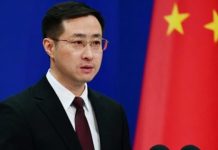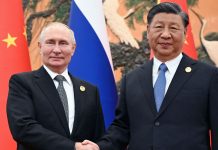BEIJING: Group has become platform for developing countries, emerging markets to collaborate
A growing number of leaders, officials and experts are voicing hopes for the BRICS mechanism to help the world better tackle the global economic downturn and prevent global governance from grinding to a halt.
They made their observations as President Xi Jinping is poised to host the 14th BRICS Summit on Thursday.
The BRICS grouping of leading emerging economies initially started in 2006 with four members-Brazil, Russia, India and China. South Africa became the fifth member in 2011.
The summit comes at a time when the gap between rich and poor countries is widening amid the COVID-19 pandemic, and readiness among nations for greater collaboration on global development is shrinking, observers said.
BRICS accounts for about 40 percent of the world’s population and 24 percent of global GDP.
Cambodian Prime Minister Hun Sen said that the BRICS nations and the international community as a whole “need to redouble their efforts to restore multilateralism, which prioritizes unity in addressing challenges”.
Xu Xiujun, director of the International Political Economy Department of the Chinese Academy of Social Sciences’ Institute of World Economics and Politics, said, “Since its establishment, BRICS has sent a strong message that its members have their own rights for seeking greater development.”
Over the past 16 years, the grouping has become “a major platform” for the BRICS countries and the rest of developing countries and emerging markets to collaborate, as well as a key forum for consultation among the five BRICS members for participation in global governance, Xu said.
“We are seeing a resurgence of Cold War mentality as well as attempts at bloc confrontation, and several developed countries have embarked on cliques, such as the ‘Indo-Pacific’ strategy, in an attempt to divide the world into two systems,” Xu said.
–The Daily Mail-China Daily news exchange item






